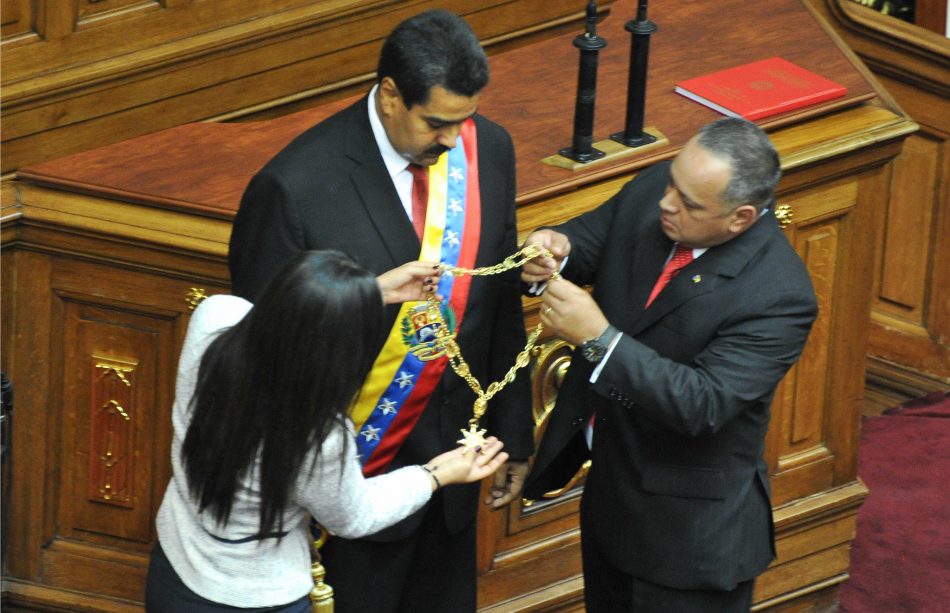
Spanish – General Suharto was appointed as the acting president in March 1967. The parliament confirmed him in office for five years in March 1968. This was the beginning of the “new order” that ruled Indonesia until 1998.
In 1971, he called for legislative elections, the first since the coup that brought him to power. His strategy was to take control of an institution of representation of interests-called “Golkar”-which he turned into an electoral and parliamentary instrument. Besides the productive sectors, he included the state bureaucracy and the army, the latter in a clear position of hierarchy. Thus, the new order could be defined as a civic-military regime.
Golkar competed with nine other parties, using many different methods of manipulation: intimidation, division, co-optation and disqualification of opponents, obliging public employees to vote for Golkar, and demanding that regional authorities comply with quotas of official votes. Everything was done to control the opposition.
The party won with 63% of the votes, followed by the Islamic Party, at 18%, and the Nationalist Party at 7%. This gave it a solid parliamentary majority and made it a hegemonic electoral machine. So it repeated the scheme five times with almost identical results in the 1977, 1982, 1987, 1992 and 1997 elections. Thus, almost three decades of simulation of competitive democracy passed. Meanwhile, the opposition parties functioned as a legitimizing mechanism.
Today, it seems that Suharto’s handbook has fallen into Maduro’s hands. If we look back and remember the crushing defeat of Chavismo in the legislative elections of December 2015, we see that that avalanche of opposition votes left it with an irreversible deficit of legitimacy. Since then, the regime has pursued various formulas of validation, from the Cuban one-party model with the National Constituent Assembly in August 2017 to the grotesque Stroessner-style fraud in the May 2018 election.
None of them worked. A fundamental problem of Chavismo is one of institutional design. A one-party regime is unthinkable in the framework of dialogue with international actors, especially the Europeans, who often give it oxygen. A repetition of shameless fraud is, in turn, not feasible. A vast majority of democracies would once again reject it as they did in 2018.
Perhaps for these reasons, the Maduro regime seems to have devoted the month of June to advance along the lines of a new electoral ambush. Note the chronology. On June 12, the Supreme Court of Justice (TSJ), itself an illegitimate body, appointed new rectors to the National Electoral Council (CNE), ignoring the constitutional provision that this is the responsibility of the National Assembly. The Supreme Court had already committed a similar violation in 2003, 2005, and 2014.
On June 15, the TSJ intervened in the Democratic Action Party, arbitrarily appointing a new Secretary-General without consulting its members. On June 16, it proceeded similarly with the Justice First party, revoking its authority and appointing a “National Coordinator.” By doing so, the court violated the autonomy of the political parties.
All signs pointed to the imminent call for parliamentary elections. And so it was, the month ended with the convocation of the CNE set for December 6. But also with a crucial addition: the deputies to be elected will increase from the current 167 to 277, a jump of 66% that has no legal or technical justification whatsoever.
The increase of seats will be accompanied by a different distribution- there lies the trap. In the 2015 parliamentary elections, 113 deputies (67.6%) were elected by a first-past-the-post vote and the remaining 51 (30.53%) by proportional representation on closed lists drawn up by the parties. The other three were representatives of indigenous peoples. In contrast, in 2020, 133 seats will be contested by a nominal vote and 144 by proportional representation.
In other words, deputies elected by the first-past-the-post vote will be reduced from 67.6% to 48% of the total, while those elected by party lists will increase from 31% to 52% of the total. Since the regime has captured the two parties with the greatest parliamentary representation, Democratic Action and Justice First, it will seek to build the lists of candidates with allies and meet the objective of finally co-opting the National Assembly. A transparent logic: vote but not elect.
Chavismo is armed with a new fraud, and its design deficit also impacts a central task of politics: the administration of time. No autocracy is sustained solely by force; it also relies on a certain consensus for its perpetuation over time. Hence, rules are essential to recycle the ruling elite and renew political activity.
Suharto’s Indonesia, as we saw, works as an analogy. Maduro pursues an extended stay in power with similar electoral mimicry, the illusion of his own “new order.” It is too late for such an uphill task. The dictatorship revealed its deceitful game with the arbitrary and illegal interventions of the TSJ. The entire democratic world has already rejected them.
Time is the implacable enemy of power, and this regime has passed its expiration date. “Twenty years is nothing” is only good for Carlos Gardel. In politics, it’s an eternity.
 Versión Español
Versión Español












